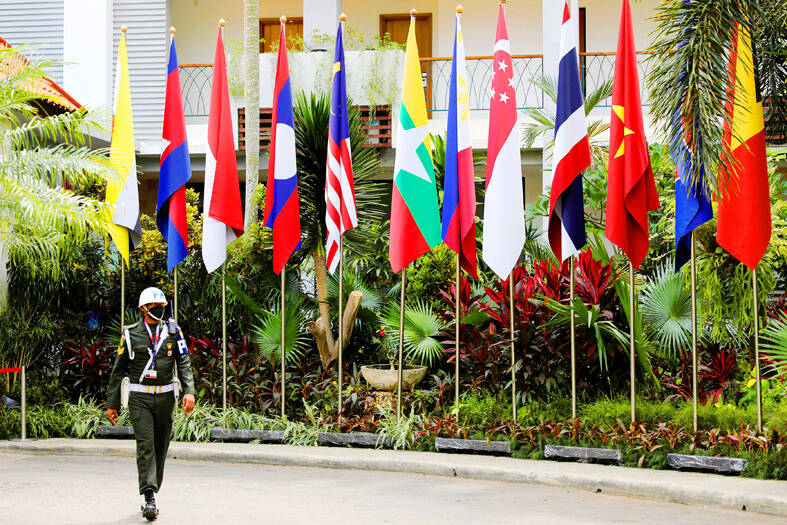Taiwan’s investment in ASEAN markets in the first half of this year surpassed the volume bound for China, as local firms continued to shift manufacturing bases away from the world’s second-largest economy at clients’ urging to avoid US-China trade frictions, the Ministry of Economic Affairs said yesterday.
Approved investments in Southeast Asia reached US$2 billion in the first six months of this year, accounting for 18.1 percent and overtaking China as the No. 1 destination at 17.6 percent, the ministry said in a report.
It attributed the changes to a global supply chain realignment and rising Chinese labor costs.

Photo: Reuters
The phenomenon became evident in 2018 when China-bound investment shrank by 50 percent to the lowest level since 2010 and plunged another 50 percent in 2019, the ministry said.
From 2018 to last year, investment destined for China declined 40.3 percent from the period of 2013 to 2017.
At the same time, investment bound for ASEAN markets grew 40.9 percent, the report said.
The bulk of investment in ASEAN was in manufacturing facilities, at 38.2 percent, followed by financial and insurance service providers (23.5 percent), and wholesale and retail operations (22.3 percent), it said.
By contrast, China-bound investment was focused on manufacturing facilities, it added.
Major local banks have set up branches in Vietnam, Thailand, Cambodia and elsewhere in Southeast Asia to better serve their Taiwanese clients and take advantage of fast-growing economies in the region.
The government has also encouraged investment in ASEAN markets under President Tsai Ing-wen’s (蔡英文) New Southbound Policy to help local companies diversify investment risks.
For the past decade, tech companies have increased their investment in ASEAN markets, whereas previously it was non-tech firms focused on the region, the ministry said.
Today, electronic component suppliers make up for 27.6 percent, followed by vendors of computers and optical devices at 12.2 percent, textile makers at 8.9 percent and base metal product suppliers at 6.2 percent, it said.
In the previous four years, base metal product suppliers accounted for 46.2 percent of investment in the region, far outweighing electronics companies at 24.2 percent, it said.
India emerged as another big beneficiary of the global supply chain realignment, with outbound investment from Taiwan soaring more than threefold after the signing of a bilateral trade agreement in 2018, the ministry said.
Investment in India this year might challenge the five-year average of US$100 million, it said, as India’s vast population has received increased attention from global technology titans and their suppliers.

South Korea’s equity benchmark yesterday crossed a new milestone just a month after surpassing the once-unthinkable 5,000 mark as surging global memory demand powers the country’s biggest chipmakers. The KOSPI advanced as much as 2.6 percent to a record 6,123, with Samsung Electronics Co and SK Hynix Inc each gaining more than 2 percent. With the benchmark now up 45 percent this year, South Korea’s stock market capitalization has also moved past France’s, following last month’s overtaking of Germany’s. Long overlooked by foreign funds, despite being undervalued, South Korean stocks have now emerged as clear winners in the global market. The so-called “artificial intelligence

NEW IDENTITY: Known for its software, India has expanded into hardware, with its semiconductor industry growing from US$38bn in 2023 to US$45bn to US$50bn India on Saturday inaugurated its first semiconductor assembly and test facility, a milestone in the government’s push to reduce dependence on foreign chipmakers and stake a claim in a sector dominated by China. Indian Prime Minister Narendra Modi opened US firm Micron Technology Inc’s semiconductor assembly, test and packaging unit in his home state of Gujarat, hailing the “dawn of a new era” for India’s technology ambitions. “When young Indians look back in the future, they will see this decade as the turning point in our tech future,” Modi told the event, which was broadcast on his YouTube channel. The plant would convert

‘SEISMIC SHIFT’: The researcher forecast there would be about 1.1 billion mobile shipments this year, down from 1.26 billion the prior year and erasing years of gains The global smartphone market is expected to contract 12.9 percent this year due to the unprecedented memorychip shortage, marking “a crisis like no other,” researcher International Data Corp (IDC) said. The new forecast, a dramatic revision down from earlier estimates, gives the latest accounting of the ongoing memory crunch that is affecting every corner of the electronics industry. The demand for advanced memory to power artificial intelligence (AI) tasks has drained global supply until well into next year and jeopardizes the business model of many smartphone makers. IDC forecast about 1.1 billion mobile shipments this year, down from 1.26 billion the prior

People stand in a Pokemon store in Tokyo on Thursday. One of the world highest-grossing franchises is celebrated its 30th anniversary yesterday.